This article was co-authored by Payam Daneshrad, MD. Dr. Payam Daneshrad is a board certified Otolaryngologist, a board eligible Facial Plastic Surgeon, and the Owner and Director of Daneshrad Clinic in Los Angeles, California. With over 19 years of experience, Dr. Daneshrad specializes in adult and pediatric Otolaryngology-head and neck surgery, packing-less nasal surgery, minimally invasive sinus surgery, and snoring treatment. He also uses the newest surgical ENT techniques for tonsillectomy, adenoidectomy, thyroidectomy, and parathyroidectomy. Dr. Daneshrad graduated with a BS and the highest honors from the University of California, Berkeley. He earned his Doctor of Medicine (MD) from Tulane University School of Medicine, where he was accepted into the AOA, the medical honor's society, and the Tulane University School of Public Health. Dr. Daneshrad received his medical training from the University of Southern California, where he currently serves as an Associate Clinical Professor. Dr. Daneshrad is the Otolaryngologist and Facial Plastic Surgeon for the Los Angeles Sparks and the athletic teams of Loyola Marymount University.
There are 8 references cited in this article, which can be found at the bottom of the page.
This article has been viewed 169,965 times.
Swimmer's ear (also called otitis external) is an infection in the outer ear that often occurs in swimmers, due to contaminated water trapped in the ear. This can cause painful inflammation, reduced hearing, and more serious symptoms. While a doctor's visit is usually in order, there are some steps you can take at home to reduce discomfort and encourage recovery.
Steps
Treating Swimmer's Ear
-
1Visit a doctor, especially for serious symptoms. Visiting a doctor is always recommended in order to prevent complications and identify underlying causes.[1] If you experience any of the following symptoms, call a doctor and arrange an appointment, preferably within 24 hours.[2]
- Fluid draining from your ear (especially if smelly, bloody, or pus-like)
- Fever
- An increase in pain or redness on the skin behind your ear
- Severe dizziness
- Facial weakness
- Buzzing or other noise in your ears
- Patients with diabetes, especially older patients or patients with severe ear pain, are at-risk for more serious infection and should visit a doctor urgently. Ask to be referred to an otolaryngologist (ear and throat doctor).[3]
-
2Keep your ear dry. Avoid swimming or putting your head underwater. While showering, place cotton balls loosely in your ears to prevent water from entering them.
- Do not attempt to dry out your ears using cotton or any other object. Cotton swabs increase the risk of infection, and are particularly dangerous when the ear is already infected.
Advertisement -
3Apply a dry, warm compress to ease pain.[4] You can use an electric heating pad set to low, or a warm, dry towel. Hold over your ear for a few minutes to relieve pain. You may notice some drainage as earwax melts.
- To create a dry, warm compress, microwave a wet washcloth, then seal it in a zip-locked bag. You can wrap a second, dry towel over the bag for more comfort.
- To avoid burning, do not apply the compress to children, or to a sleeping person.
-
4Take pain medication if necessary. Over-the-counter NSAIDs such as ibuprofen or acetaminophen can reduce pain if you are experiencing significant discomfort.
Treating an Undamaged Eardrum
-
1Do not use these if you have serious symptoms. The serious symptoms listed earlier may be signs that you have a ruptured eardrum, caused by pressure from the infection. The following treatments are unsafe with this condition, since the fluids can drain past the eardrum and into your inner ear. Always visit a doctor if you have one of these symptoms along with swimmer's ear.
- If you have ever had a damaged eardrum or ear surgery in the past, consult a doctor before using the treatments below, even if you do not have these symptoms.[5]
-
2Warm a mix of rubbing alcohol and vinegar. Create an equal mix of white vinegar and 70% rubbing alcohol, heated until warm but not hot.
- Alternatively, purchase a non-aqueous acetic acid eardrop at a drugstore.[6]
- Putting cold or hot liquids in your ear may lead to dizziness. Try to warm the solution to roughly your body temperature.
-
3Rinse your ear if it feels blocked. Some earwax is fine, but if the ear canal is blocked or if dirt or debris is in the ear, it may need cleaning first. Fill a bulb syringe with the vinegar and alcohol mixture and squirt a trickle into your ear canal, letting it drain out.
- Warm water rinsing is not recommended for swimmer's ear.[7]
- If your ear still feels blocked, visit an otolaryngologist or ask a general practice doctor for a referral. The otolaryngologist can clean your ear more effectively using suction.
- Never perform this step on a person with diabetes, not even at a doctor's office.[8]
-
4Use the solution as eardrops. The alcohol will help remaining moisture evaporate, while the vinegar will make your ear canal more acidic. Both of these make your ear a less welcoming place for bacteria. Apply with the following method:
- Warm the solution by rubbing the container in your hands or placing it in a cup of warm water – without mixing the two liquids together.
- Lie down with your ear facing upward.
- Have an assistant place two or three drops on the wall of the ear canal, allowing air to escape so drops can get into the ear. Gently wiggling your ears will aid in this process.
- Remain lying down for a few minutes.[9]
-
5Ask a doctor about further treatment. If there are no signs of improvement, a doctor should be able to examine your ear and recommend one or more of the following treatments:[10]
- An antibacterial eardrop (or more rarely, an antifungal eardrop)
- Insertion of a wick into a swollen ear canal, to allow eardrops to penetrate
- Oral or injected antibiotics if the infection has spread
- Surgical cleaning of the ear canal
- Incision and drainage of an abscess
- Let your doctor know if you are diabetic, immune-compromised, or if you have had ear surgery or a punctured eardrum in the past.
Preventing Swimmer's Ear
-
1Avoid cleaning the inside of your ear. Contrary to popular belief, cleaning your ear with a cotton swab or any other object can actually damage the ear canal and increase the risk of infection. A thin layer of earwax is necessary for a healthy ear.
- Even excessive water irrigation to remove earwax can cause damage. If you suffer from excessive earwax, ask a doctor for advice on safe treatment.
- Excessive soap use on your ears can increase the chance of infection due to the raised pH levels.[11]
-
2Consider using earplugs when swimming. The use of earplugs while swimming is controversial among medical professionals. On the one hand, they can prevent water entering your ear canal. On the other hand, inserting any object into your ear can damage it and make it more susceptible to infection.[12] Ask your doctor for advice, taking into account the state of your ear canal and the likelihood of exposure to bacteria where you swim.
-
3Keep your ears dry. Use a dry towel or hair dryer to dry your ears after swimming or showering. If you feel water in your ear canal, place a drop of vinegar mixed with a drop of rubbing alcohol in your ears to hasten drying and reduce the chance of bacterial growth.[13]
-
4Protect your ears from hair products. Hair spray and hair dye contain chemicals that can damage your ear canal. Place cotton balls loosely over your ear canal to prevent this during application.[14]
-
5Visit an ear and throat doctor to keep ears clean. Go see an otolaryngologist if you have itchy, flaky, scaly ears or extensive earwax. If necessary, make regular appointments to have your ears cleaned professionally.
Expert Q&A
-
QuestionWhy will the rubbing alcohol and vinegar mixture help?
 Payam Daneshrad, MDDr. Payam Daneshrad is a board certified Otolaryngologist, a board eligible Facial Plastic Surgeon, and the Owner and Director of Daneshrad Clinic in Los Angeles, California. With over 19 years of experience, Dr. Daneshrad specializes in adult and pediatric Otolaryngology-head and neck surgery, packing-less nasal surgery, minimally invasive sinus surgery, and snoring treatment. He also uses the newest surgical ENT techniques for tonsillectomy, adenoidectomy, thyroidectomy, and parathyroidectomy. Dr. Daneshrad graduated with a BS and the highest honors from the University of California, Berkeley. He earned his Doctor of Medicine (MD) from Tulane University School of Medicine, where he was accepted into the AOA, the medical honor's society, and the Tulane University School of Public Health. Dr. Daneshrad received his medical training from the University of Southern California, where he currently serves as an Associate Clinical Professor. Dr. Daneshrad is the Otolaryngologist and Facial Plastic Surgeon for the Los Angeles Sparks and the athletic teams of Loyola Marymount University.
Payam Daneshrad, MDDr. Payam Daneshrad is a board certified Otolaryngologist, a board eligible Facial Plastic Surgeon, and the Owner and Director of Daneshrad Clinic in Los Angeles, California. With over 19 years of experience, Dr. Daneshrad specializes in adult and pediatric Otolaryngology-head and neck surgery, packing-less nasal surgery, minimally invasive sinus surgery, and snoring treatment. He also uses the newest surgical ENT techniques for tonsillectomy, adenoidectomy, thyroidectomy, and parathyroidectomy. Dr. Daneshrad graduated with a BS and the highest honors from the University of California, Berkeley. He earned his Doctor of Medicine (MD) from Tulane University School of Medicine, where he was accepted into the AOA, the medical honor's society, and the Tulane University School of Public Health. Dr. Daneshrad received his medical training from the University of Southern California, where he currently serves as an Associate Clinical Professor. Dr. Daneshrad is the Otolaryngologist and Facial Plastic Surgeon for the Los Angeles Sparks and the athletic teams of Loyola Marymount University.
Board Certified Otolaryngologist It helps clean the ear, and because the alcohol evaporates quickly, it cools the ear canal, which gives some comfort as well.
It helps clean the ear, and because the alcohol evaporates quickly, it cools the ear canal, which gives some comfort as well. -
QuestionHow can I stop getting ear infections?
 Payam Daneshrad, MDDr. Payam Daneshrad is a board certified Otolaryngologist, a board eligible Facial Plastic Surgeon, and the Owner and Director of Daneshrad Clinic in Los Angeles, California. With over 19 years of experience, Dr. Daneshrad specializes in adult and pediatric Otolaryngology-head and neck surgery, packing-less nasal surgery, minimally invasive sinus surgery, and snoring treatment. He also uses the newest surgical ENT techniques for tonsillectomy, adenoidectomy, thyroidectomy, and parathyroidectomy. Dr. Daneshrad graduated with a BS and the highest honors from the University of California, Berkeley. He earned his Doctor of Medicine (MD) from Tulane University School of Medicine, where he was accepted into the AOA, the medical honor's society, and the Tulane University School of Public Health. Dr. Daneshrad received his medical training from the University of Southern California, where he currently serves as an Associate Clinical Professor. Dr. Daneshrad is the Otolaryngologist and Facial Plastic Surgeon for the Los Angeles Sparks and the athletic teams of Loyola Marymount University.
Payam Daneshrad, MDDr. Payam Daneshrad is a board certified Otolaryngologist, a board eligible Facial Plastic Surgeon, and the Owner and Director of Daneshrad Clinic in Los Angeles, California. With over 19 years of experience, Dr. Daneshrad specializes in adult and pediatric Otolaryngology-head and neck surgery, packing-less nasal surgery, minimally invasive sinus surgery, and snoring treatment. He also uses the newest surgical ENT techniques for tonsillectomy, adenoidectomy, thyroidectomy, and parathyroidectomy. Dr. Daneshrad graduated with a BS and the highest honors from the University of California, Berkeley. He earned his Doctor of Medicine (MD) from Tulane University School of Medicine, where he was accepted into the AOA, the medical honor's society, and the Tulane University School of Public Health. Dr. Daneshrad received his medical training from the University of Southern California, where he currently serves as an Associate Clinical Professor. Dr. Daneshrad is the Otolaryngologist and Facial Plastic Surgeon for the Los Angeles Sparks and the athletic teams of Loyola Marymount University.
Board Certified Otolaryngologist Outer ear infections are caused by water exposure more often than not, or patients using foreign bodies like Q-tips in their ears. Avoiding anything in the ear canal is the best way to avoid an ear infection of the canal.
Outer ear infections are caused by water exposure more often than not, or patients using foreign bodies like Q-tips in their ears. Avoiding anything in the ear canal is the best way to avoid an ear infection of the canal.
Warnings
- Do not use ear candles as there are no proven benefits in their removal of earwax. In fact, the insertion of ear candles or other objects into the ear can lead to serious injury.⧼thumbs_response⧽
References
- ↑ Payam Daneshrad, MD. Board Certified Otolaryngologist. Expert Interview. 30 September 2020.
- ↑ http://www.nlm.nih.gov/medlineplus/ency/article/000622.htm
- ↑ http://www.aafp.org/afp/2012/1201/p1055.html
- ↑ Payam Daneshrad, MD. Board Certified Otolaryngologist. Expert Interview. 30 September 2020.
- ↑ http://www.entnet.org/content/swimmers-ear
- ↑ http://emedicine.medscape.com/article/994550-treatment
- ↑ http://www.merckmanuals.com/professional/ear_nose_and_throat_disorders/external_ear_disorders/external_otitis_acute.html
- ↑ http://www.aafp.org/afp/2012/1201/p1055.html
- ↑ http://www.entnet.org/content/swimmers-ear
- ↑ http://www.aafp.org/afp/2012/1201/p1055.html
- ↑ http://emedicine.medscape.com/article/994550-treatment#aw2aab6b6b6
- ↑ http://emedicine.medscape.com/article/994550-treatment
- ↑ http://www.nlm.nih.gov/medlineplus/ency/article/000622.htm
- ↑ http://www.entnet.org/content/swimmers-ear
- ↑ http://www.ncbi.nlm.nih.gov/pubmed/20091565?dopt=Abstract
About This Article
To get rid of swimmer's ear, keep your ear dry by placing cotton balls loosely in your ears when you shower and avoiding swimming. While you wait for your swimmer's ear to heal, apply a warm, dry towel or a heating pad to your ear to help ease the pain. You can also take an over-the-counter pain medication like ibuprofen or acetaminophen. If you experience serious symptoms like fever or fluid draining from your ear, visit a doctor as soon as possible. To learn how to prevent swimmer's ear, scroll down!
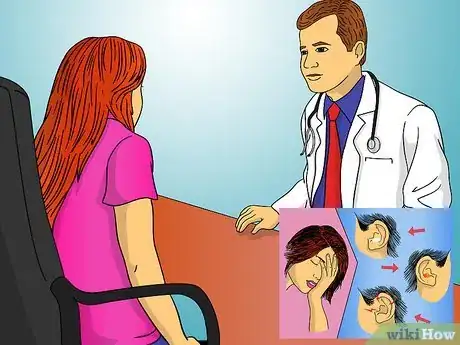

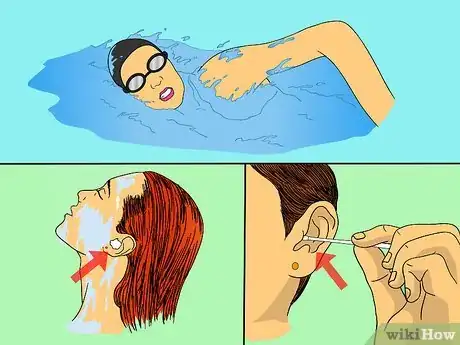
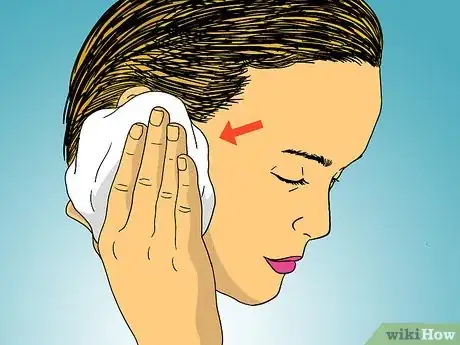
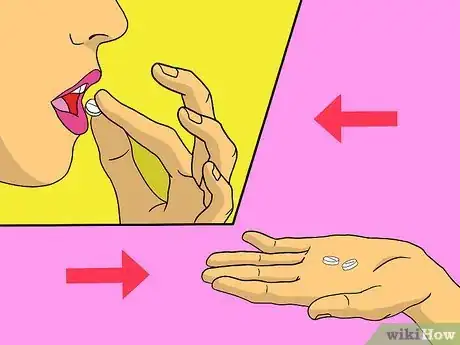
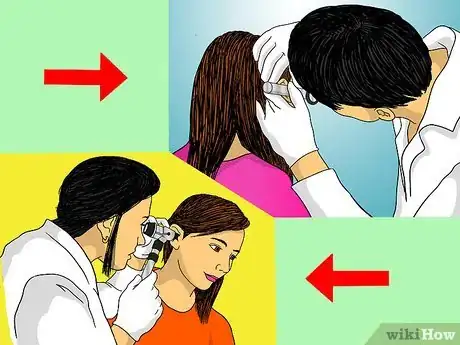
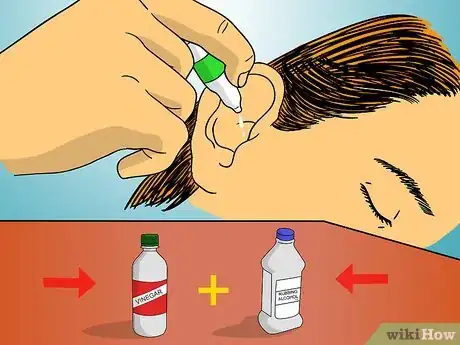
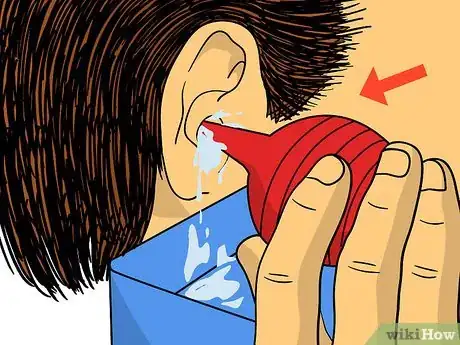
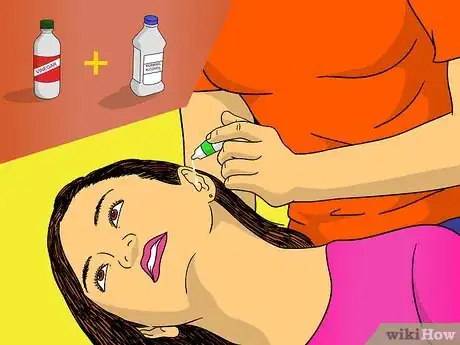
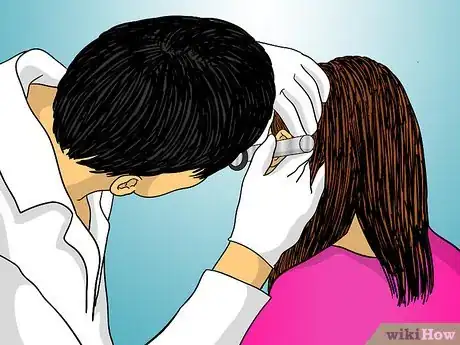
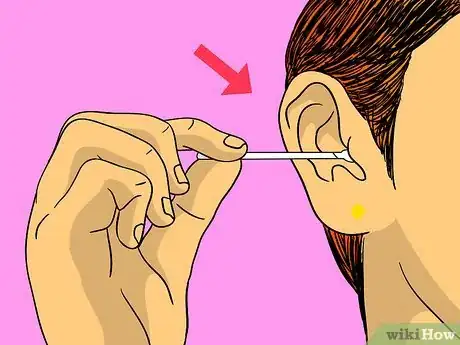
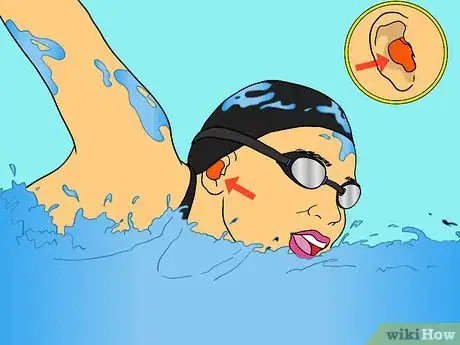
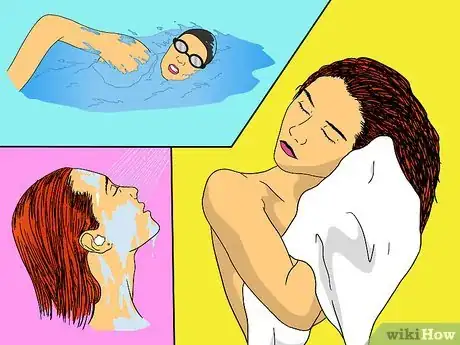
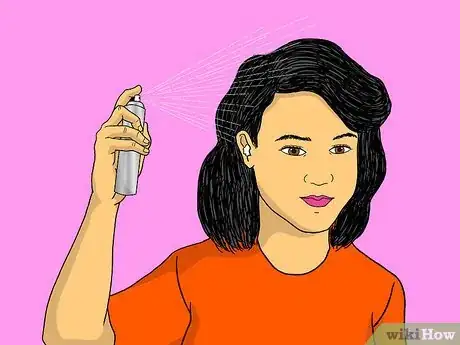
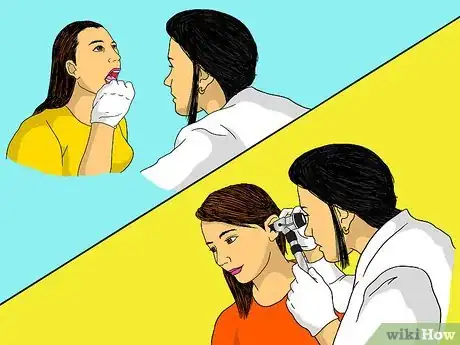


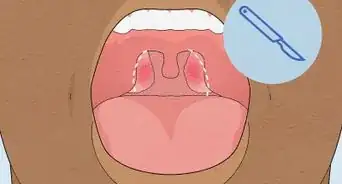

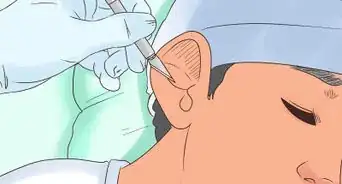





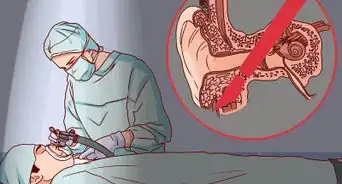














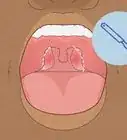




































Medical Disclaimer
The content of this article is not intended to be a substitute for professional medical advice, examination, diagnosis, or treatment. You should always contact your doctor or other qualified healthcare professional before starting, changing, or stopping any kind of health treatment.
Read More...